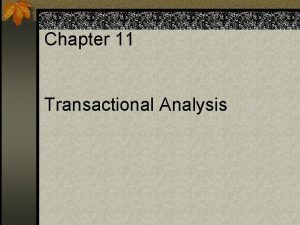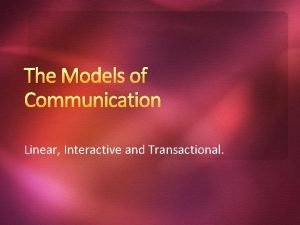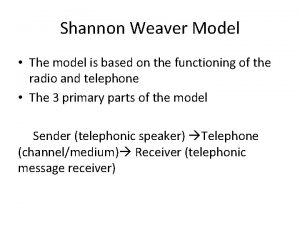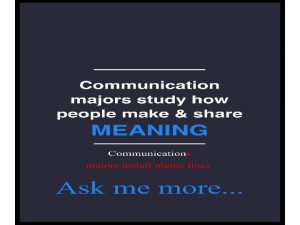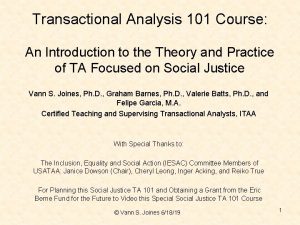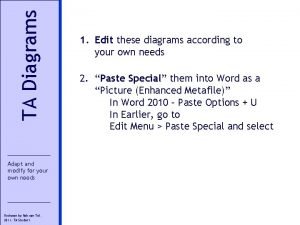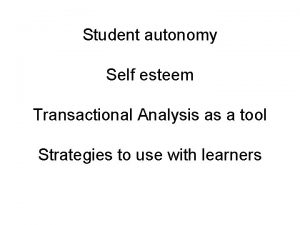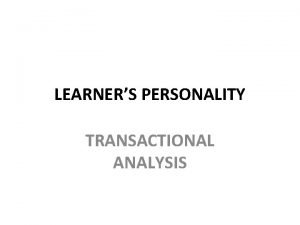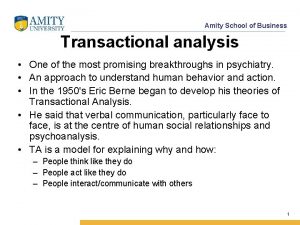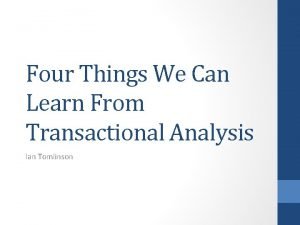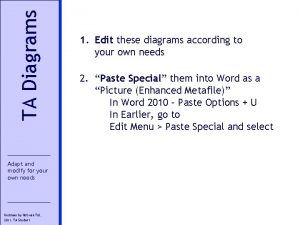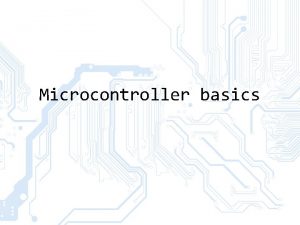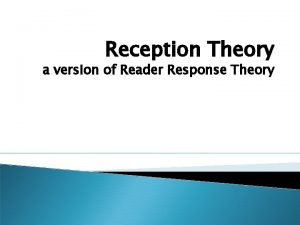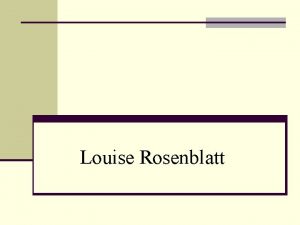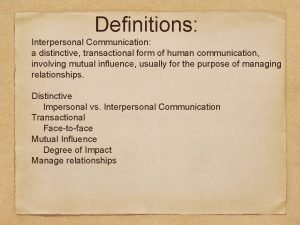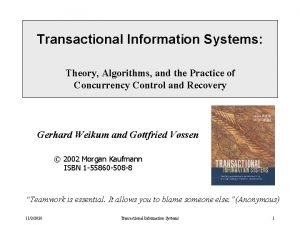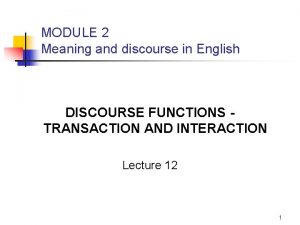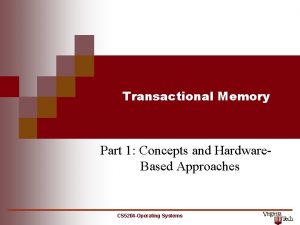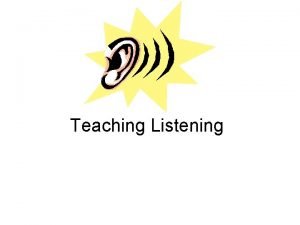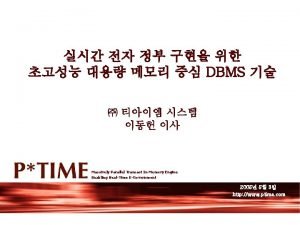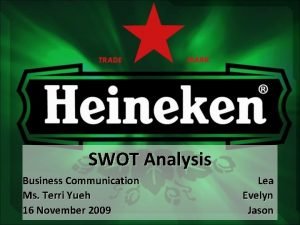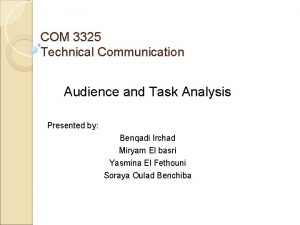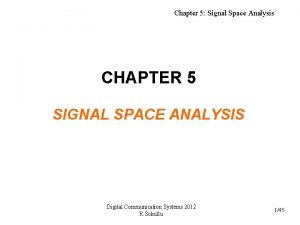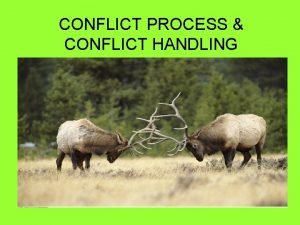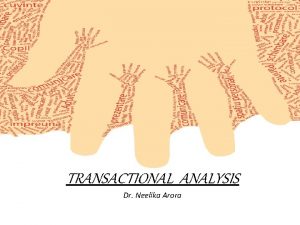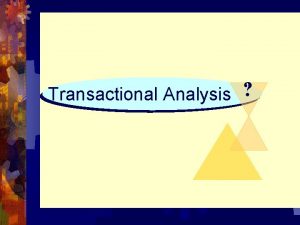TRANSACTIONAL ANALYSIS CONFLICT IN COMMUNICATION TRANSACTIONAL ANALYSIS Transactional





![TRANSACTIONAL ANALYSIS • Parent in the child [not o. k. ] • Adapted child: TRANSACTIONAL ANALYSIS • Parent in the child [not o. k. ] • Adapted child:](https://slidetodoc.com/presentation_image_h2/5568ce3bcb15e4accb55c81dcc0779be/image-6.jpg)























![TRANSACTIONAL ANALYSIS • Scale of emotional risk to reward stroke value: • Withdraw [------] TRANSACTIONAL ANALYSIS • Scale of emotional risk to reward stroke value: • Withdraw [------]](https://slidetodoc.com/presentation_image_h2/5568ce3bcb15e4accb55c81dcc0779be/image-30.jpg)





































- Slides: 67

TRANSACTIONAL ANALYSIS CONFLICT IN COMMUNICATION

TRANSACTIONAL ANALYSIS • Transactional analysis: (Identifying behavior) • Developed by Dr. Eric Berne • Neurosurgeon Dr. Wilder Penfield inspired Dr. Berne • Researching epilepsy • Found playback available with certain stimulation to brain. • Found out that nothing can be forgotten • 3 separate sources of behavior (ego states) • Parent – taught concept of life – learned from your parents • Adult – learned concept of life – deals with the here and now • Child – felt concept of life – experienced as a child

TRANSACTIONAL ANALYSIS • Parent Functions: • Teaches how-to • Sets limits • Protects • Guides • Keeps traditions • Judges • Nurtures • Gives advice

TRANSACTIONAL ANALYSIS • Critical parent vs. • Rights and wrongs rule our lives scared • Directs behavior (governs us) Nurturing parent Would comfort when Based on past experiences • Value system • Parental ego state: -- (Critical and nurturing parent) expressed inwardly and outwardly • Past coming to fruition

TRANSACTIONAL ANALYSIS • Adult Functions: • Learned; Processing • 1. Data gathering 3. Problem Solving • 2. Sorting 4. Decision making • Unemotional and serious all the time.
![TRANSACTIONAL ANALYSIS Parent in the child not o k Adapted child TRANSACTIONAL ANALYSIS • Parent in the child [not o. k. ] • Adapted child:](https://slidetodoc.com/presentation_image_h2/5568ce3bcb15e4accb55c81dcc0779be/image-6.jpg)
TRANSACTIONAL ANALYSIS • Parent in the child [not o. k. ] • Adapted child: • Modifies behavior to please parents, trained • Uses knowledge; adapts to be praised or punished • Natural child: • Impulsive; expressive; untrained; cry; spontaneous • We want what we want and we want it now.

TRANSACTIONAL ANALYSIS • Little professor: • Manipulative; creative; intuitive • Figures things out; when to get things • Reads nonverbal behavior well • 3 ego states that work together to meet basic needs.

TRANSACTIONAL ANALYSIS • Child functions: • 1. Spontaneous 5. Adventurous • 2. Carefree 6. Pouting • 3. Jealousy 7. Rebellious • 4. Curious 8. Conforming

TRANSACTIONAL ANALYSIS • Ego boundary permeability – allows a person to move through ego states at varying speeds based on personal experience. • Excluding ego state – using only one ego state • Excluded ego state – leaving out one ego state

TRANSACTIONAL ANALYSIS • Ego state contamination: • One’s ego state boundaries are broken down • Getting emotional about things; phobia • Becoming a walking stereotype

TRANSACTIONAL ANALYSIS • Transactions – Interactions between people (Stimulus Response) • Three types: • Complimentary (parallel) • Crossed • Ulterior

TRANSACTIONAL ANALYSIS • Complimentary: • When a message is sent out and responded to from the same ego state. (parallel transactions) • Once started, they tend to continue in that direction. • Target an ego state and respond from it.

TRANSACTIONAL ANALYSIS P P A A C C

TRANSACTIONAL ANALYSIS • Crossed: • When people glare at each other. • When an unexpected response is made. • “What was that all about? ” • Interrupts flow; stops the flow of communication.

TRANSACTIONAL ANALYSIS P P A A C C

TRANSACTIONAL ANALYSIS • Weak transactions: • Lack feelings of intensity; lack commitment • Indirect transactions: • Trying to give a message to a third party/person out of conversation. • Diluted transactions: • Half affectionate and half hostile. • Basis for psychological game playing.

TRANSACTIONAL ANALYSIS • Ulterior transactions: • More than one ego state. • Hidden agendas (double message) • Overt (social) verbal and nonverbal • Covert (psychological) non apparent; manipulative

TRANSACTIONAL ANALYSIS P P A A C C

TRANSACTIONAL ANALYSIS • Angular Ulterior: • Looks at adult to adult • Trying to hook someone by going for child or adult • Manipulative

TRANSACTIONAL ANALYSIS P P A A C C

TRANSACTIONAL ANALYSIS • Duplex Ulterior: • More complex • Overt and covert are working together and exchanging

TRANSACTIONAL ANALYSIS • Strokes: • Any act of recognition from another person. • Individuals are always trying to balance strokes socially. • Most of the strokes in the world are negative. • A stroke is a stroke (positive or negative) • Attention is attention

TRANSACTIONAL ANALYSIS • We are born into this world needing strokes. • Physical contact; when young • Marasmus lack of physical contact • Lack of receiving recognition/strokes leads to stroke hunger.

TRANSACTIONAL ANALYSIS • Touch hunger changes to recognition hunger • Stroke hunger • Playing psychological games • Working harder for attention • Stroke value varies from person to person • What may satisfy one individual’s needs for recognition may not satisfy another’s.

TRANSACTIONAL ANALYSIS • Unconditional stroke (positive or negative) • You did nothing to deserve it. • Someone being nice without expectation of reciprocity • Conditional stroke (positive or negative) • What you get for what you do … • Usually have strings attached … • “Thank you for cleaning your room. ” • “Stop doing that, aren’t you ashamed of yourself? ” • Negative conditional strokes are the most common.

TRANSACTIONAL ANALYSIS • Because kids don’t get enough positive strokes, they will find a way to get any … including negative ones. • Negative strokes are better than none

TRANSACTIONAL ANALYSIS • Time structures: • How is time structured for strokes? • Six possible ways to get strokes: • Withdraw from others (physically or psychologically) • Safety, even in a crowded room. • Ritual exchanges hellos and goodbyes • Pass time when people talk about harmless topics; not too familiar • Sports • Things that don’t really matter • Small talk • Allows exchanges and strokes

TRANSACTIONAL ANALYSIS • Activity • Ways to structure time and keep busy • Task, rituals; pass times • Psychological games • People play games due to lack of intimacy • Exchanges bad feelings through the use of ulterior transactions. • Ex. “Blemish” – finding faults with others’ feelings

TRANSACTIONAL ANALYSIS • Intimacy • Very rare as an individual • Compared to the amount of people we meet • Genuine caring/empathy • Authenticity • Free of games, free of exploitation • Actual feeling • It scares people to be more vulnerable than usual • People are afraid to share normally • People prefer to stay in their comfort zones
![TRANSACTIONAL ANALYSIS Scale of emotional risk to reward stroke value Withdraw TRANSACTIONAL ANALYSIS • Scale of emotional risk to reward stroke value: • Withdraw [------]](https://slidetodoc.com/presentation_image_h2/5568ce3bcb15e4accb55c81dcc0779be/image-30.jpg)
TRANSACTIONAL ANALYSIS • Scale of emotional risk to reward stroke value: • Withdraw [------] • Ritual [-----] • Pass time [------] • Activity [--------] • Psychological games [---------] • Intimacy [------------] Highest stroke value!

TRANSACTIONAL ANALYSIS • Feelings: • Racket: • substitute real “here and now” feelings • Stamp collecting: • • • Saving up bad feelings to cash in People have favorite bad feelings Saved chronic unpleasant bad feelings Relate mostly to bad feelings Gold stamps • Cashing in stamps we don’t deserve or need. • No stamp is good. (Stamps are saved up and collected in “stamp books. ”)

TRANSACTIONAL ANALYSIS • Racket: • Converting all feelings into our favorite bad feelings • Rackets hide authentic feeling but not all bad feeling are rackets, only the repetitive, nonproductive ones.

TRANSACTIONAL ANALYSIS 10 books • Stamps: Red (Anger) 100 books Tantrum Kill • Gray (Fear) Anxiety Panic • Blue (sad) Cry Major depression • Brown (hurt) Sulk Suicide • White (Martyr) Marry drunk Marry junkie • Green (sick) Throw up Organ removal • Gold (Goodie) A night out New car/vacation

TRANSACTIONAL ANALYSIS • Attempt stamp burning: • React to one situation at a time • When you first get bad feelings • Not allowing overlapping feelings

TRANSACTIONAL ANALYSIS • Psychological games: • Structuring our time with games, there is a winner and a loser. • Game – An ongoing series of complimentary ulterior transactions progressing to a well defined, predictable outcome. • Games require two or more to play • They tend to repeat with complimentary games

TRANSACTIONAL ANALYSIS • Games are played to: • Structure time • Receive negative strokes ( collect bad feelings) • Confirm life position (ok; not-ok) • Avoid intimacy • Maintain rackets • Provide predictability

TRANSACTIONAL ANALYSIS • Is predictability better than unpredictability? • Particular games people play: • “Why don’t you … yes but” justifying your depression by not accepting solutions • “Kick me” How you spend your stamps and attempt to accrue more by asking to get run over. • “If it weren’t for you …” I’d have accomplished more.

TRANSACTIONAL ANALYSIS • “Schlemeil. ” Trying to obtain forgiveness by being clumsy. • “Alcoholic. ” Allowing yourself into a mind altering state of being and rationalizing its outcomes. • You will need: • A persecutor – from an interpersonal relationship • Rescuer – Friend • Patsy or Dumby – nurturer; mother • Bartender – person on your side

TRANSACTIONAL ANALYSIS • “Debtor. ” getting attention for owing people money • “NIGYYSOB. ” Now I’ve got you, you son of a B******; entrapment; setting people up to look bad or fail. • “See what you made me do. ” Blaming other people for their mistakes. • “Courtroom. ” Argument where you need an outside opinion; looking for a judge. • “Frigid person. ” Provoke and then deny over and over (repetitive)

TRANSACTIONAL ANALYSIS • “Stocking. ” Revealing extra skin to get someone’s attention • “Harried. ” Volunteering for more than you can do. • “Blemish. ” Fault finding; someone showing you what to do, then finding a fault in it. • “Wooden leg. ” “I have an impairment, can you do something for me? ”

TRANSACTIONAL ANALYSIS • “Lets you and him fight. ” Two people provoked by one person to fight. • “Uproar. ” Parent/child game; “why did you come home so late? ” • “Stupid. ” Does dumb stuff to be ridiculed • “Cops and robbers. ” breaking rules and trying not to get caught

TRANSACTIONAL ANALYSIS • Intensity of games: • 1 st degree: • Social damage • Small collection of stamps • Cash in for crying, anger, etc. • 2 nd degree: • Psychological damage • Bigger stamp collection • Quit (job, school, marriage)

TRANSACTIONAL ANALYSIS • 3 rd degree: • Tissue damage • Go for broke • Homicide; suicide

TRANSACTIONAL ANALYSIS • How to stop games: • Ignore them • Confront then • Talk about how it makes you feel • Refuse the bad feelings • Deal with the facts from your adult (adult ego states do not play games) • Ask yourself: • How did the game start? • Do I feel bad for my Parent or Child?

TRANSACTIONAL ANALYSIS • Organizational Communication Psychologist – Dr. Robert Bramsom • Common problem employee types – Coping with difficult people • The Sherman Tank • Behavior: • • Domination through intimidation Victims feel like they are being run over Attack you personally Abusive, abrupt and arrogant • Why? • Strong need to prove themselves • Sense of what others should do • Gets immediate needs met

TRANSACTIONAL ANALYSIS • Cannot have collaborative disagreement; value aggressiveness • Solution: • Don’t show rage; stand up for yourself • Give them time to quit tantrum • Interrupt or cut in; strong, assertive • Get attention carefully; be appropriate • Speak from your own point of view • Don’t go for a head on fight • Stand up to them

TRANSACTIONAL ANALYSIS • The Sniper • Behavior: • They strike out from cover • Not too subtle digs • Not so playful teasing • Takes pot shots • Why? • They believe others should think and act the way the sniper expects them to. • They think they are superior to others. • They feel like they are in control when they undercut you. • They are good at it. • Solution: • Surface the attack … bring it out in the open. • Ask questions • Group confirmation • Remove yourself from the situation calmly

TRANSACTIONAL ANALYSIS • Time bomb (Exploder) • Behavior: • Most of the time they act very nice. • Adult tantrums is their tool • More out of control than “tanks” or “snipers. ” • Truly an explosion • Irritable and overly emotional • Why? • Tantrums reduce the “opponent’” to • Passivity • Silence • Their own tantrums • Solution: • Give them time to quite the tantrum • Change venue • Get away from explosion

TRANSACTIONAL ANALYSIS • The whiner (complaining constantly) • Behavior: • • • Highly developed and skilled at complaining Tends to sit down because they are going to stay a while. Voice often has a “sing-song” quality that blames and accuses. Finds faults with everything We tend to placate or become defensive • Why? • • • Arm chair leaders May be truly powerless Have a “How things should be” perspective. They may think they are perfect They are triangular complainers. (Gossip, rumor, complaint)

TRANSACTIONAL ANALYSIS • Solution: • Listen • Acknowledge • Be prepared to interrupt • Use limited responses • Don’t agree with them • Move/switch to problem solving • State the facts

TRANSACTIONAL ANALYSIS • The brick wall (Clamming up) • Behavior: • You ask a question or make a statement and get a closed answer • It’s like talking to a “brick wall. ” • They get unresponsive when you need an answer. • It is difficult to draw them out. • Why? • It is their way of handling/avoiding difficult interpersonal situations. • They can hurt or control others (by frustrating them) • They get to avoid attention on self

TRANSACTIONAL ANALYSIS • Solution: • Try and find ways to break tension • Say what you see • Name your feelings; be descriptive • Give a friendly, silent stare

TRANSACTIONAL ANALYSIS • The super agreeable • Behavior: • Always smiles and has s friendly word. • They communicate “whatever you want, ” you got it – but then they don’t come through. • They say what you want to hear, making you think they agree with you. • They use humor. • Why? • They need to be liked and loved by others. • They are trying to avoid conflict. • Unrealistic comments are made to please others.

TRANSACTIONAL ANALYSIS • Solution: • Reassure them that being truthful with each other is best • Be personal; Connect • Don’t allow them to make unrealistic commitments • Listen to their humor.

TRANSACTIONAL ANALYSIS • The wet blanket negativist • Behavior: • Always having the attitude that “that will never work. ” • Says, “We’ve tried that before. ” • They hurt working groups • Why? • They gain power by tapping the potential for despair. • They already and truly feel defeated. • They believe that people, organizations and things stand in their way. • They believe everyone cannot be trusted; feel anger • In their early years, they were unable to work through disappointment.

TRANSACTIONAL ANALYSIS • Solution: • Don’t argue. • Use it as an acid test • Stay positive • Don’t rush to come to conclusions.

TRANSACTIONAL ANALYSIS • The know it all the bulldozer • Behavior: • Productive people who push all obstacles out of their way. • Use a tone of certainty • Leave others feeling not as good as before. • No room for anyone else’s ideas • If something goes wrong, they blame it on others’ incompetence. • Why? • They are opinionated • They usually get what they want because people would rather give in than promote conflict. • They want to have things their way.

TRANSACTIONAL ANALYSIS • Solution: • Do your homework; have counter evidence ready • Listen and acknowledge • Question them firmly • Listen to yourself • Acknowledge confidence • Let them be the experts

TRANSACTIONAL ANALYSIS • The fake know it all the hot air balloon • Behavior: • They sound off whether they know anything or not. • Considered a phony expert/con artist • Typically smooth and convincing (self and others) • Why? • “I want people to think that I am brilliant. ” • They believe that others will think, “It sounds right, so it probably is. ” • “I believe it is true so, why not say so. ” • “No one is calling me a liar, so I guess I’m brilliant. ”

TRANSACTIONAL ANALYSIS • Solution: • Face them with facts

TRANSACTIONAL ANALYSIS • The procrastinator indecisive staller • Behavior: • Put things off until they are at a critical state • Cannot make up their minds about how to do something. • There are too many options and I’m not sure which to do, so I’ll do nothing. • Why? • They are afraid of making the wrong decision • They want to please everyone • They are worried they won’t please, so they don’t do anything. • Others around them lose enthusiasm

TRANSACTIONAL ANALYSIS • Solution: • Support them • Remind them about deadlines • Reassure their capability

TRANSACTIONAL ANALYSIS • Aspects of the partnership conflict approach which need to be continually checked: • Diversity and differences: • Clarify understanding of each other in the interpersonal relationship. • Use differences in the relationship to see how and what we can improve. • Needs: • It’s a perpetual conflict which cannot be satisfied. • Affected by ignoring other’s needs; ignoring your own needs; ignoring the relationship’s needs.

TRANSACTIONAL ANALYSIS • Perception: • Self-perception – The way you perceive yourself is based on your understanding of the way others perceive you. • Perceptions of the other party – We create pictures of foes in our head, which include only negative aspects of their true selves. • Perceptions of the situation – A situation’s perceptions needs to be clarified by every party involved to make sure everyone understands and see the same thing. • Perception of threat – Using things that are hurtful against someone you feel is a threat, even though there may be none.

TRANSACTIONAL ANALYSIS • Power: • The capacity to act effectively and the ability to influence • Values and principles: • Do individuals make judgements based on values or rely on principles to get their way? • Because of my status, whatever I believe or say, goes. • Feelings and emotions: • Feeling and emotions make things worse for the parties involved. • Objectivity is the key to resolution. • Internal conflicts: • Holding onto something or not knowing how to deal with it.

TRANSACTIONAL ANALYSIS

TRANSACTIONAL ANALYSIS
 Transactions in transactional analysis
Transactions in transactional analysis Linear and interactive models of communication
Linear and interactive models of communication Communication process example conversation
Communication process example conversation Barnlund model of communication
Barnlund model of communication The shannon weaver model
The shannon weaver model Transactional model of communication
Transactional model of communication Internal conflict meaning
Internal conflict meaning What is conflict and conflict resolution?
What is conflict and conflict resolution? Internal conflict definition and examples
Internal conflict definition and examples Life positions in transactional analysis
Life positions in transactional analysis Transactional analysis in organisational behaviour
Transactional analysis in organisational behaviour Counter injunctions transactional analysis
Counter injunctions transactional analysis Ta diagram
Ta diagram Life positions in transactional analysis
Life positions in transactional analysis Define the term transactional analysis
Define the term transactional analysis Time structuring in transactional analysis
Time structuring in transactional analysis Transactional analysis in business
Transactional analysis in business Time structuring in transactional analysis
Time structuring in transactional analysis Ta student diagrams
Ta student diagrams Transactional analysis drivers
Transactional analysis drivers Conflict resolution is a(n) communication skill
Conflict resolution is a(n) communication skill N parallel
N parallel What is oral communication and written communication
What is oral communication and written communication Parallel communication examples
Parallel communication examples Examples of mass communication
Examples of mass communication Diff between oral and written communication
Diff between oral and written communication Serial communication vs parallel communication
Serial communication vs parallel communication Short transactional writing examples
Short transactional writing examples Transactional writing dialogue
Transactional writing dialogue Transactional leadership and transformational leadership
Transactional leadership and transformational leadership Peer to peer transactional replication
Peer to peer transactional replication Peer to peer transactional replication
Peer to peer transactional replication Reader reaction theory
Reader reaction theory Transactional theory rosenblatt
Transactional theory rosenblatt Evs classroom
Evs classroom Community provider business model examples
Community provider business model examples Ulterior transaction example
Ulterior transaction example Interpersonal vs transactional
Interpersonal vs transactional Transactional leadership definition
Transactional leadership definition Transactional system
Transactional system Why is steve jobs a transformational leader
Why is steve jobs a transformational leader Transactional and interpersonal conversation
Transactional and interpersonal conversation Transactional discourse example
Transactional discourse example Edexcel gcse english language paper 2
Edexcel gcse english language paper 2 Transactional risk insurance
Transactional risk insurance Four i's of transformational leadership
Four i's of transformational leadership Transformational leadership
Transformational leadership Transactional pricing
Transactional pricing Transactional exchange
Transactional exchange Hardware transactional memory
Hardware transactional memory Howard schultz
Howard schultz Unforeseen transactional risk
Unforeseen transactional risk Hardware transactional memory
Hardware transactional memory What are speaking skills
What are speaking skills Transactional listening
Transactional listening Transformational vs transactional leadership
Transformational vs transactional leadership Restricted transactional memory
Restricted transactional memory Transactional writing exemplars
Transactional writing exemplars Transactional memory
Transactional memory C++ transactional memory
C++ transactional memory Swot analysis of heineken
Swot analysis of heineken Audience analysis in technical communication
Audience analysis in technical communication Conversion of continuous awgn channel to vector channel
Conversion of continuous awgn channel to vector channel Define external conflict
Define external conflict Peace topic
Peace topic Millet system
Millet system Structural conflict
Structural conflict Cudsa communication model stand for
Cudsa communication model stand for
